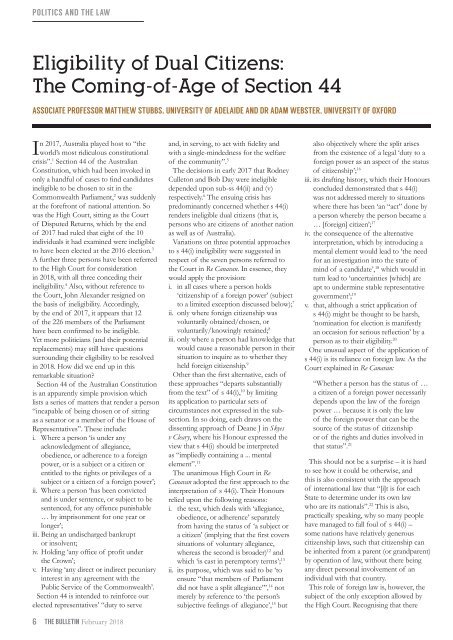LSB February 2018_Web_LSSA
You also want an ePaper? Increase the reach of your titles
YUMPU automatically turns print PDFs into web optimized ePapers that Google loves.
POLITICS AND THE LAW<br />
Eligibility of Dual Citizens:<br />
The Coming-of-Age of Section 44<br />
ASSOCIATE PROFESSOR MATTHEW STUBBS, UNIVERSITY OF ADELAIDE AND DR ADAM WEBSTER, UNIVERSITY OF OXFORD<br />
In 2017, Australia played host to “the<br />
world’s most ridiculous constitutional<br />
crisis”. 1 Section 44 of the Australian<br />
Constitution, which had been invoked in<br />
only a handful of cases to find candidates<br />
ineligible to be chosen to sit in the<br />
Commonwealth Parliament, 2 was suddenly<br />
at the forefront of national attention. So<br />
was the High Court, sitting as the Court<br />
of Disputed Returns, which by the end<br />
of 2017 had ruled that eight of the 10<br />
individuals it had examined were ineligible<br />
to have been elected at the 2016 election. 3<br />
A further three persons have been referred<br />
to the High Court for consideration<br />
in <strong>2018</strong>, with all three conceding their<br />
ineligibility. 4 Also, without reference to<br />
the Court, John Alexander resigned on<br />
the basis of ineligibility. Accordingly,<br />
by the end of 2017, it appears that 12<br />
of the 226 members of the Parliament<br />
have been confirmed to be ineligible.<br />
Yet more politicians (and their potential<br />
replacements) may still have questions<br />
surrounding their eligibility to be resolved<br />
in <strong>2018</strong>. How did we end up in this<br />
remarkable situation?<br />
Section 44 of the Australian Constitution<br />
is an apparently simple provision which<br />
lists a series of matters that render a person<br />
“incapable of being chosen or of sitting<br />
as a senator or a member of the House of<br />
Representatives”. These include:<br />
i. Where a person ‘is under any<br />
acknowledgment of allegiance,<br />
obedience, or adherence to a foreign<br />
power, or is a subject or a citizen or<br />
entitled to the rights or privileges of a<br />
subject or a citizen of a foreign power’;<br />
ii. Where a person ‘has been convicted<br />
and is under sentence, or subject to be<br />
sentenced, for any offence punishable<br />
… by imprisonment for one year or<br />
longer’;<br />
iii. Being an undischarged bankrupt<br />
or insolvent;<br />
iv. Holding ‘any office of profit under<br />
the Crown’;<br />
v. Having ‘any direct or indirect pecuniary<br />
interest in any agreement with the<br />
Public Service of the Commonwealth’.<br />
Section 44 is intended to reinforce our<br />
elected representatives’ “duty to serve<br />
and, in serving, to act with fidelity and<br />
with a single-mindedness for the welfare<br />
of the community”. 5<br />
The decisions in early 2017 that Rodney<br />
Culleton and Bob Day were ineligible<br />
depended upon sub-ss 44(ii) and (v)<br />
respectively. 6 The ensuing crisis has<br />
predominantly concerned whether s 44(i)<br />
renders ineligible dual citizens (that is,<br />
persons who are citizens of another nation<br />
as well as of Australia).<br />
Variations on three potential approaches<br />
to s 44(i) ineligibility were suggested in<br />
respect of the seven persons referred to<br />
the Court in Re Canavan. In essence, they<br />
would apply the provision:<br />
i. in all cases where a person holds<br />
‘citizenship of a foreign power’ (subject<br />
to a limited exception discussed below); 7<br />
ii. only where foreign citizenship was<br />
voluntarily obtained/chosen, or<br />
voluntarily/knowingly retained; 8<br />
iii. only where a person had knowledge that<br />
would cause a reasonable person in their<br />
situation to inquire as to whether they<br />
held foreign citizenship. 9<br />
Other than the first alternative, each of<br />
these approaches “departs substantially<br />
from the text” of s 44(i), 10 by limiting<br />
its application to particular sets of<br />
circumstances not expressed in the subsection.<br />
In so doing, each draws on the<br />
dissenting approach of Deane J in Skyes<br />
v Cleary, where his Honour expressed the<br />
view that s 44(i) should be interpreted<br />
as “impliedly containing a ... mental<br />
element”. 11<br />
The unanimous High Court in Re<br />
Canavan adopted the first approach to the<br />
interpretation of s 44(i). Their Honours<br />
relied upon the following reasons:<br />
i. the text, which deals with ‘allegiance,<br />
obedience, or adherence’ separately<br />
from having the status of ‘a subject or<br />
a citizen’ (implying that the first covers<br />
situations of voluntary allegiance,<br />
whereas the second is broader) 12 and<br />
which ‘is cast in peremptory terms’; 13<br />
ii. its purpose, which was said to be ‘to<br />
ensure “that members of Parliament<br />
did not have a split allegiance”’, 14 not<br />
merely by reference to ‘the person’s<br />
subjective feelings of allegiance’, 15 but<br />
also objectively where the split arises<br />
from the existence of a legal ‘duty to a<br />
foreign power as an aspect of the status<br />
of citizenship’; 16<br />
iii. its drafting history, which their Honours<br />
concluded demonstrated that s 44(i)<br />
was not addressed merely to situations<br />
where there has been ‘an “act” done by<br />
a person whereby the person became a<br />
… [foreign] citizen’; 17<br />
iv. the consequence of the alternative<br />
interpretation, which by introducing a<br />
mental element would lead to ‘the need<br />
for an investigation into the state of<br />
mind of a candidate’, 18 which would in<br />
turn lead to ‘uncertainties [which] are<br />
apt to undermine stable representative<br />
government’; 19<br />
v. that, although a strict application of<br />
s 44(i) might be thought to be harsh,<br />
‘nomination for election is manifestly<br />
an occasion for serious reflection’ by a<br />
person as to their eligibility. 20<br />
One unusual aspect of the application of<br />
s 44(i) is its reliance on foreign law. As the<br />
Court explained in Re Canavan:<br />
“Whether a person has the status of …<br />
a citizen of a foreign power necessarily<br />
depends upon the law of the foreign<br />
power … because it is only the law<br />
of the foreign power that can be the<br />
source of the status of citizenship<br />
or of the rights and duties involved in<br />
that status”. 21<br />
This should not be a surprise – it is hard<br />
to see how it could be otherwise, and<br />
this is also consistent with the approach<br />
of international law that “[i]t is for each<br />
State to determine under its own law<br />
who are its nationals”. 22 This is also,<br />
practically speaking, why so many people<br />
have managed to fall foul of s 44(i) –<br />
some nations have relatively generous<br />
citizenship laws, such that citizenship can<br />
be inherited from a parent (or grandparent)<br />
by operation of law, without there being<br />
any direct personal involvement of an<br />
individual with that country.<br />
This role of foreign law is, however, the<br />
subject of the only exception allowed by<br />
the High Court. Recognising that there<br />
6<br />
THE BULLETIN <strong>February</strong> <strong>2018</strong>


















